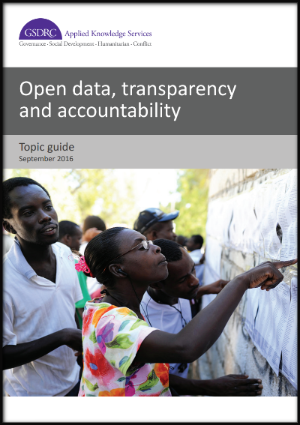How human rights scholars conceal social wrongs. That’s the title of an Open Democracy article published yesterday, which takes issue with the way that international comparative indices (such as Ciri Human Rights Data Project and Freedom in the World) hide injustice in rich western democracies. Specifically, the authors are angered by the US government’s consistently high ranking...
When Indicators Get in the Way, Go Report Minimal?
Now, there’s a lot we could debate here about data collection processes, or tools, or when and how data clerks should be employed – but that’s not the point. Instead, we suggest that a growing amount of the qualitative evidence indicates that costs of collecting and reporting on the data that inform high-level performance indicators (for various agencies) can be quite high – perhaps higher than...
All the books on researchers and the interwebs
Or at least the three I had in my bookmarks. But I feel like there’s been a lot in recent weeks. Are there others to add to this list? Being a Scholar in the Digital Era: Transforming Scholarly Practice for the Public Good (Jessie Daniels and Polly Thistlewaite, Eds). Strong normative bent in this one, for open research as well as social impact. Explicit focus on collaborating with...
The problem with the problem with input transparency
This isn’t about research or methods, so I’ll be brief. Cass Sunstein, US policy veteran and eminent scholar, recently released a draft article distinguishing between input and output transparency, suggesting that arguments are weaker for the former, and offering reasons why input transparency might often not be a good thing. (To grossly oversimplify: there are too many inputs to policy-making...
Crimes against data, talk by Andrew Gelman
Andrew Gelmen gives a great talk on how data gets abused in research and politics. He goes a bit into the statistical weeds at times with T & P values and the like, but he’s also a pleasure to listen to. And he gives some great examples of both academics and public figures that either “treat statistics as a means to prove what they already know, or as hoops to be jumped through...
New Research Guide on Open Data and Accountabiltiy

The GSDRC is a resource centre that synthesises and summarizes research for use in international development programming. It’s a great initiative for making scholarly work relevant and useful in the real world, and last week they released a new topic guide on open data and accountability. I was excited to take a look, as I’ve previously found their guides and responses to research help desk...
Methods for Measuring Open Data
Back in 2014, the Web Foundation and the GovLab at NYU brought together open data assessment experts from Open Knowledge, Organisation for Economic Co-operation and Development, United Nations, Canada’s International Development Research Centre, and elsewhere to explore the development of common methods and frameworks for the study of open data. It resulted in a draft template or framework for...
Against the civic tech sector
Stefaan G. Verhulst recently offered some suggestions on how to “build a civic tech field that can last and stand the test of time.” Stefaan is a smart guy, connected, well informed, and his suggestions make smart sense of a messy landscape. But they also accept a fundamental premise which tends to go unchecked in international discussions about civic tech. His introduction: …we are yet to...
Can Millennials Save E-government?
Many analysts (including yours truly, in a book called “Government 2.0”) predicted that by 2016, digital government would already long be a reality. In practice, the “e-gov revolution” has been an exceedingly slow-moving one. Sure, technology has improved some processes, and scores of public services have moved online, but the public sector has hardly been transformed. What initial e-gov efforts...
What’s e-gov got to do with it?
Lots. Emily Shaw posted a great piece on the relevance of e-governance research for civic technology earlier this month. She argues that academic e-government research dwarfs the nearly non-existent academic interest in civic tech (as evidenced by 169,000 vs 185 hits on google scholar), and that civic technologists should care about research on e-government. And in the civic tech world, we can...
